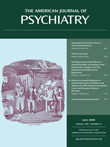To The Editor: Rates of posttraumatic stress disorder (PTSD) reported for service members returning from Iraq and Afghanistan have varied
(1,
2) . To determine whether one population could yield different rates of PTSD, we performed a record review of on-the-record screenings for PTSD conducted at a military facility where an anonymous survey was performed earlier for a research study
(3) .
In both the anonymous study and clinical screenings, service members were given the PTSD Checklist, Military Version (PCL-M). Since the population and screening instrument were similar, we hypothesized that comparing the anonymous study results with the on-the-record screenings would demonstrate the effect of anonymity in determining the rates of PTSD.
Institutional Review Board approval was obtained to perform a chart review at the Naval Medical Center San Diego. This military hospital employs approximately 6,000 health care providers and frequently deploys these individuals to combat zones such as Iraq and Afghanistan. Most of these deployments are in support of Marine Corps operations. Upon returning from deployment, service members participate in a screening that includes the PCL-M. The PCL-M is a self-report instrument that has been validated against clinical criteria and other research measures
(4) . It can be scored for broad criteria, which matches the DSM diagnosis, or strict criteria, in which broad criteria are required in addition to a total severity score. At Naval Medical Center San Diego, those individuals who meet broad criteria are encouraged to undergo a diagnostic interview.
The number of charts assayed was 408. This number was based on a power estimate intended to detect 50% underreporting for on-the-record screenings by broad criteria. The rates of PTSD by broad and strict criteria were computed using the same methods that were used in the anonymous study
(3) . Statistical comparisons were determined using Mann-Whitney tests.
A retrospective review of on-the-record screenings in medical personnel returning from Iraq or Afghanistan showed that 32 out of 408 (7.8%) showed broad criteria for PTSD, and 22 out of 408 (5.4%) showed strict criteria. The previous anonymous screen
(3) showed that 16 out of 102 (15.7%) service members returning from combat deployments met broad criteria for PTSD, and 9 out of 102 (8.8%) met strict criteria. The relative risk of screening positive for PTSD based on broad criteria was 0.5 when reporting was performed anonymously versus on-the-record. Mann-Whitney tests showed the difference between the rates to be statistically significant for broad criteria (p=0.02).
One possibility for these results is that when faced with the consequences of a positive screen for PTSD, service members underreport. However, on-the-record screenings are mandatory for all service members returning from deployment, whereas the anonymous survey required voluntary participation. Thus, it is also possible that 1) those individuals with symptoms to report were more likely to complete the anonymous form and 2) anonymous surveys overreport symptoms. Nevertheless, our results suggest that anonymity plays a role in how individuals report PTSD symptoms. Further outreach is needed to allow those individuals with PTSD to feel safe reporting their symptoms in a way that can connect them to clinical services.

